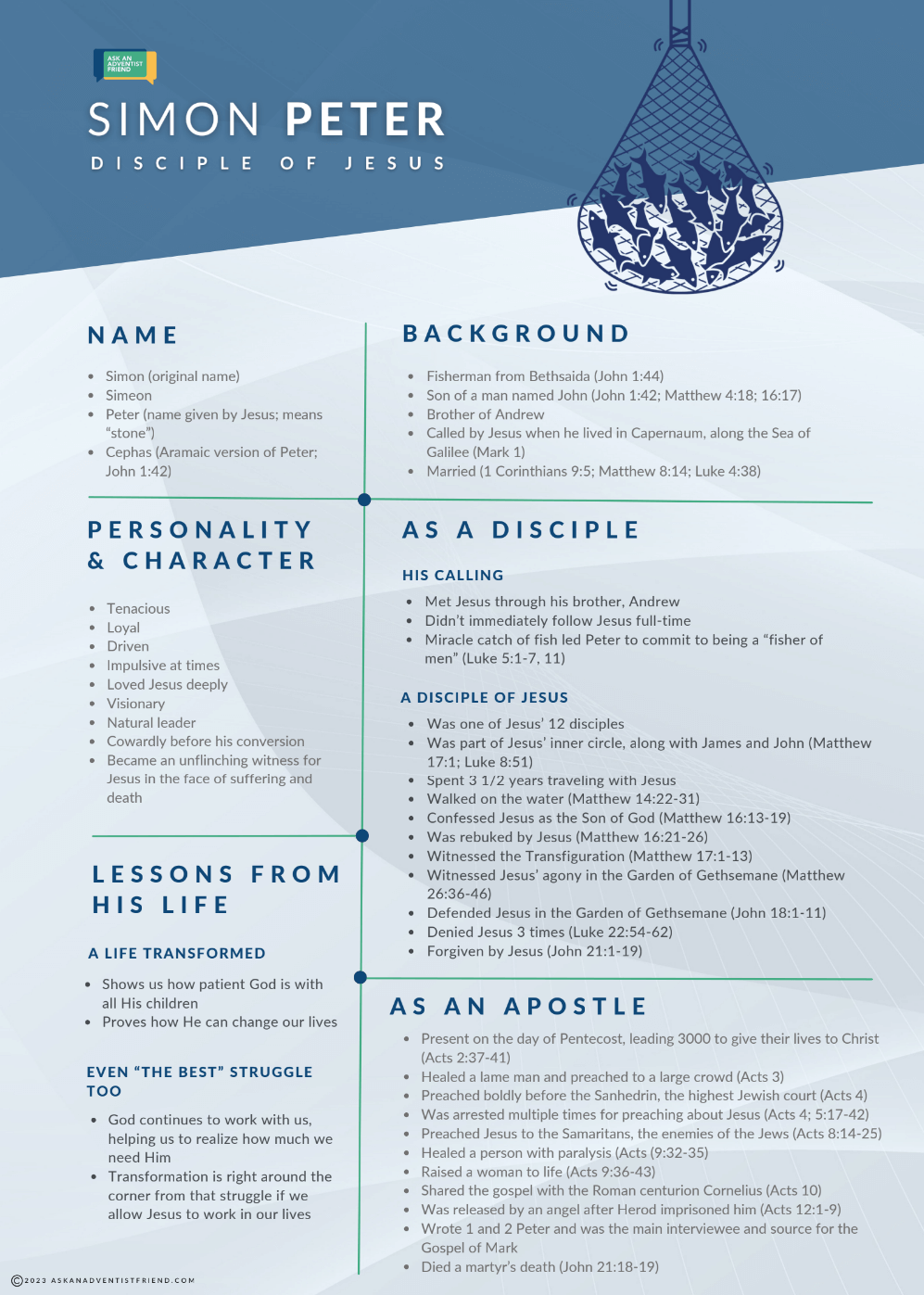A Look into the Life of Simon Peter, Jesus’ Apostle
 Simon Peter was a simple fisherman who became one of the most well-known disciples of Jesus Christ. He is perhaps best known for being part of the inner circle of three disciples, walking on water, and proclaiming Him as the Son of God.
Simon Peter was a simple fisherman who became one of the most well-known disciples of Jesus Christ. He is perhaps best known for being part of the inner circle of three disciples, walking on water, and proclaiming Him as the Son of God.
Many people also relate to the “humanness” of Peter in the descriptions of the Bible: his impulsiveness, the way he spoke before thinking, and how he struggled to live up to his own ideals.
And through it all, Jesus never gave up on him.
After the resurrection and ascension, Peter continued to play an important part in the Christian church as one of the twelve apostles and one who helped pave the way for Gentiles to be welcomed among Christians (Acts 10).
You’ll find stories of him throughout the Gospel accounts of Jesus’ ministry and in the book of Acts. We’ll explore those as we look at:
- Simon Peter’s name
- His background
- His personality and character
- His calling
- His time as a disciple
- His ministry as an apostle
- Lessons from his life
First, let’s address his name variations.
Simon Peter’s name

Photo by Juan Davila on Unsplash
You may see this disciple called Simon, Simeon, Peter, Simon Peter, or Cephas. Simon was his original Hebrew name, but Jesus gave him the name “Peter,” which means “a stone” (from the Greek petros1). Cephas is the Aramaic version of Peter (John 1:42).
Peter’s background in the Bible
Simon Peter and his brother Andrew were fishermen from Bethsaida (John 1:44). However, when Jesus called them, they lived in Capernaum along the Sea of Galilee (Mark 1).
The Bible doesn’t provide many details about Peter’s family, though it tells us he was the son of a man named John—or Jonah or Jona, in some translations (Matthew 4:18; 16:17).
We don’t know the exact reason for the differences in the spelling of his father’s name, though they could’ve been differences in the manuscripts or Greek vs. Aramaic variations of the names. Professor Gerald Klingbeil, DLit, suggests that Jesus calling Peter the “son of Jonah” was a way of “linking His disciple to the notorious Old Testament prophet,” Jonah.2
We also know Peter was married (1 Corinthians 9:5); his mother-in-law is one of the people Jesus healed during His ministry (Matthew 8:14; Luke 4:38).
Peter’s personality and character
Peter was a tenacious, loyal, driven, and sometimes impulsive individual. He loved his teacher deeply. He was a visionary, excited for the kingdom of God and ready to do anything to make it happen.
Among the disciples, he was often the first to speak for the group, sometimes without thinking (Matthew 18:21; 19:27; Mark 10:28; 11:21; Luke 8:45). At times, it got him in trouble!
For example, one time when someone asked him if Jesus paid the temple tax, he was quick to respond with what he thought was the “right” answer—only to be later corrected (Matthew 17:24-26).
Nonetheless, he was a natural leader. We don’t know whether this was intentional, but his name often shows up first in the list of disciples (Matthew 10:2; Luke 6:12-16).
He was also very open to the promptings of the Holy Spirit.
When Jesus preached a difficult sermon that left some people shaking their heads and turning away, He turned to the disciples and asked, “Do you also want to go away?” (John 6:67, NKJV).
Peter didn’t hesitate:
“Lord, to whom shall we go? You have the words of eternal life. Also we have come to believe and know that You are the Christ, the Son of the living God” (verses 68-69, NKJV).
He even pledged to lay down his life for Jesus (John 13:36-37).
And yet, he also had some unrecognized weaknesses. He didn’t understand the Messiah’s true purpose and became fixated on the idea of setting up an earthly kingdom. He had his mind set on acclaim, glory, and freedom from the oppressive Roman Empire—not sacrifice or servant leadership. When he saw Jesus walking the path of sacrifice, he shied away from it.
Peter’s story was not over, though.
Jesus kept working with him, and he eventually went from cowardice to bravery, becoming an unflinching apostle who shared the Gospel in the face of suffering and death. Let’s follow that journey.
Peter’s calling

Image by Harrison Haines
Peter’s call to become a disciple took place in stages. Though he met Jesus through his brother Andrew, he didn’t immediately become a full-time follower. It wasn’t until later that a miracle catch of fish led him to commit himself as a “fisher of men.”
The first meeting happened when Andrew, a follower of John the Baptist, rushed to tell his brother Peter, “We have found the Messiah!” (John 1:41, ESV)
Verse 42 describes further:
“Jesus looked at him and said, ‘You are Simon the son of John. You shall be called Cephas’ (which means Peter)” (ESV).
Jesus knew him inside and out and saw in him someone He could work with. Adventist author Ellen White put it this way:
“The eye of Christ read his character and life history. His impulsive nature, his loving, sympathetic heart, his ambition and self-confidence, his fall, his repentance, his labors, and his martyr death—the Savior read it all.”3
But scholars believe Peter didn’t become a full-time disciple then but continued to work as a fisherman until two years later:
“Peter had, at that time, responded to the invitation to recognize Jesus as the Messiah, and had associated himself intermittently with the Lord in His ministry. Nearly two years later, probably in the late spring or early summer of A.D. 29 (see on Matt. 4:12 ), Christ called him to permanent discipleship, together with his brother Andrew and his business partners James and John (see Luke 5:1-11 ; see on v. 7 ).”4
This explains why we find a separate and different account of his calling in Luke 5:1-7.
He had just spent all night trying to catch fish. Nothing. What he probably wanted most was to go home and rest.
And that’s when Jesus showed up and asked to preach from Peter’s boat so all the crowds could hear him.
But the next request was a little much:
“Put out into the deep and let down your nets for a catch” (Luke 5:4, ESV).
What does this rabbi know about fishing, he probably thought. Doesn’t he know that fish are much harder to catch during the day?
Despite his doubts, Peter complied (Luke 5:5). And he was in for a surprise.
The nets overflowed with fish—so much so that they broke and Peter had to call over his fishing partners for help.
“When Simon Peter saw it, he fell down at Jesus’ knees, saying, ‘Depart from me, for I am a sinful man, O Lord!’” (Luke 5:8, NKJV)
Jesus assured him:
“‘Don’t be afraid,’ Jesus told Simon. ‘From now on you will be catching people’” (Luke 5:10, CSB).
Now, Peter could see that Jesus was capable of providing for Him. He could trust Him. There was a greater mission in store for Peter than he could imagine: “Follow Me” (Mark 1:17, NKJV).
With this call, Peter “left everything and followed” Jesus (Luke 5:11, ESV).
Peter as Christ’s disciple
Peter was one of the 12 disciples as well as part of Jesus’ inner circle with James and John (Matthew 17:1; Luke 8:51). Together as a group, the disciples spent three and a half years traveling with the Messiah. They watched Him teach, preach, and heal—and assisted in that work (Matthew 10:1-11).
We’ll highlight some significant experiences from Peter’s time as a disciple:
Walking on water (Matthew 14:22-31)

Photo by Barth Bailey on Unsplash
After the incredible feeding of the 5,000, Jesus sent the disciples on ahead in a boat while He went to pray.
As the disciples rowed their boat, a storm rolled in. They were struggling to keep the boat afloat as the waves tossed it around when, suddenly, they caught sight of a figure walking on the sea. Terrified, they cried, “It is a ghost!” (Matthew 14:26, ESV).
Jesus’ voice rang out above the storm, assuring them it was Him.
That’s when Peter decided to make a bold request:
“Lord, if it is You, command me to come to You on the water” (Matthew 14:28, ESV).
And Jesus did. But as Peter stepped into the water and began to walk, he caught sight of the storm around him. Fear filled him, and he began to sink. “Lord, save me!” (Matthew 14:30, ESV).
Jesus immediately reached out and pulled him up, rebuking him for his doubt. He still needed to learn what it meant to depend entirely on his Savior.
Confessing Jesus as the Son of God (Matthew 16:13-19)
Peter was one of the first disciples to verbally acknowledge Jesus as the Son of God (Matthew 16:16).
Jesus affirmed that this wasn’t Peter’s own knowledge; the Holy Spirit had revealed it to him (Matthew 16:17). Then, He told him:
“You are Peter, and on this rock I will build My church, and the gates of Hades shall not prevail against it” (Matthew 16:18, NKJV).
And with such incredible knowledge revealed to Peter through the Holy Spirit, it might seem natural to assume that the rock in this verse is referring to him as the one on whom the church would be built. But was it?
A look at the context helps us realize that Christ was actually referring to Himself. Here’s why:
- He had just asked who the disciples believed Him to be, and He was now presenting Himself as the foundation of the church.
- The Bible repeatedly refers to Christ/God as a rock (2 Samuel 22:47; Matthew 7:24-25; 1 Corinthians 10:4).
- Peter was not immovable. The verse speaks of the gates of hell (Hades) not prevailing against the rock, meaning that whoever is the foundation of the church (the rock) could not be overcome by the devil and his forces. And yet, this wasn’t the case with Peter—he denied Jesus and was overcome by the devil very soon after that moment. Only Jesus is truly immovable, able to conquer the devil and death.
- The New Testament tells us Christ is the church’s foundation (1 Corinthians 3:11).
Notice also what Seventh-day Adventist scholars say about this passage:
“Had Christ made Peter chief among the disciples, they would not thereafter have been involved in repeated arguments about which of them ‘should be accounted the greatest.’”5
Being rebuked by Jesus (Matthew 16:21-26)

Photo by Pixabay
Not long after acknowledging Jesus’ divinity, Peter received one of the sternest rebukes Jesus ever gave to His disciples.
Christ was telling His disciples about His upcoming suffering and death.
But Peter didn’t want to hear it. Matthew 16:22 tells us that he took Jesus aside “and began to rebuke Him, saying, ‘Far be it from you, Lord! This shall never happen to you’” (ESV).
Yes, you read that right. Peter was described as attempting to “rebuke” Jesus.
Jesus gave him a stinging response:
“Get behind me, Satan! You are a hindrance to me. For you are not setting your mind on the things of God, but on the things of man” (Matthew 16:23, ESV).
It’s not that Jesus was calling Peter “Satan.” But rather, He was calling out the Deceiver (Satan) for trying to work through Peter.
Even though Peter seemed to want the best for Jesus, it turned out that he was still more concerned about his own hopes for how events would play out. Without realizing it at the time, he was reacting from the position of his own agenda, his own safety.
Many other Jews at the time were looking for a Messiah to free the Jewish nation from Roman bondage. Peter also wanted an earthly kingdom that would come through conquest—not pain and humility.
Adventist author and professor Andy Nash points this out:
“The driving issue in Peter’s life wasn’t how he stacked up against the other disciples. The issue was how his plans stacked up against Jesus’ plans. This was his biggest point of weakness.”6
Despite all the time Peter had spent with Christ, his culture and the beliefs of the time were still influencing his understanding of the kingdom of heaven.
He didn’t fully know himself. He still had some soul-searching to do. And it would be a slow, painful lesson.
Witnessing the Transfiguration (Matthew 17:1-13)

Photo by Egg thing
Not long after sharing about His coming death, Jesus took His inner circle up on a mountain where He became enveloped in a bright light and communicated with Moses and Elijah.
As Peter and the other two disciples took in this miraculous sight, God the Father spoke from heaven, affirming the divinity of the Son of God:
“This is my beloved Son, with whom I am well pleased; listen to Him” (Matthew 17:5, ESV).
In fear, the three disciples there dropped to their knees, prostrate. But Jesus approached them and told them not to be afraid (verse 7). And the experience was over.
This memory would long stay with Peter, leading him to write about his experience later when he was an apostle in the early Christian church (2 Peter 1:16-18).
Witnessing Jesus in the Garden of Gethsemane (Matthew 26:36-46)
As in the case of the Transfiguration, Peter was one of the three disciples who went with Jesus and witnessed His agony in the Garden of Gethsemane (Matthew 26:37).
Jesus asked Peter, James, and John to stay up with Him and pray—yet they all fell asleep, perhaps overwhelmed by what their Master was experiencing.
It would be a long night.
Defending Jesus in the Garden of Gethsemane (John 18:1-11)
Soon after Jesus’ prayer in the Garden, He roused the disciples, knowing His captors were on their way. When the mob showed up and tried to arrest Jesus, Peter stepped into action and tried to defend his master with his sword.
But all he managed to do was cut off the ear of the high priest’s servant.
Jesus stopped him and healed the man’s ear:
“Put your sword into the sheath. Shall I not drink the cup which My Father has given Me?” (John 18:11, NKJV)
Again, Peter showed that he didn’t understand the Messiah’s mission. He was being rash and reactive instead of considering what Christ was really about to do.
The night wasn’t over yet, either.
Denying Jesus (Luke 22:54-62)

Photo by Ricardo Porto on Unsplash
Peter was emphatic that he would never deny Jesus (Mark 14:31). While sitting in His presence, the thought seemed ridiculous.
But again, he didn’t fully know himself.
After his rabbi’s arrest, Peter trailed behind, hoping to catch a glimpse of the trial (Mark 14:54). While warming himself by a fire, he was approached twice and asked if he was with Jesus. Each time, he denied that he was or that he even knew Him.
The third time, as only a rough fisherman can, he cursed and said, “I do not know the man” (Matthew 26:74, ESV).
At that moment, Jesus turned and looked at Peter (Luke 22:61).
“The Greek word for ‘looked straight at’ is emblepo. … It means to see with the mind, to understand.”7
One of those gazes that seems to pierce the soul.
And it broke Peter. Matthew 26:75 tells us that “he went out and wept bitterly” (ESV). He had done what he said he’d never do. Could he really be forgiven?
Being forgiven (John 21:1-19)

Photo by Teryll KerrDouglas on Unsplash
After Christ rose from the dead, some angels gave a message to Mary at the empty tomb:
“Go, tell His disciples—and Peter—that He is going before you into Galilee; there you will see Him” (Mark 16:7, NKJV).
He still wanted to meet the one who’d denied Him. He knew Peter’s heart.
And so, this disciple—who probably felt like a betrayer and a failure—found himself in his old stomping grounds when he decided to go fishing. Maybe he felt like he had been disqualified from serving Christ:
“Peter’s words did not simply suggest a nostalgic, one night fishing excursion on Galilee just for old time’s sake. It rather implies that Peter was chucking his call to ministry and permanently returning to his old way of life. In this disciple’s brief announcement there was disillusionment and exasperation, along with a shade of desperation.”8
But the night was a fruitless one. No fish.
As morning dawned, though, he and the disciples with him caught sight of someone on the shore. The man called out to them:
“Cast the net on the right side of the boat, and you will find some [fish]” (John 21:6, ESV).
As they did so, their nets filled to the overflowing.
In a moment of déjà vu, Peter realized that the man on the shore was Jesus. Could it be that Jesus still had a purpose for him? That He hadn’t given up on him?
Jesus had a heart-to-heart with Peter. Only a couple days before, Peter had denied Him three times. Now, three times, Jesus asked him to affirm his love and commitment. Then, Jesus called him to care for the church.
His second chance was about to begin.
The apostle Peter
Christ’s resurrection and the power of the Holy Spirit transformed the life of Peter. Rather than being overconfident in himself, he learned to depend on God through prayer. His ministry was no longer about getting his agenda accomplished; it was about fulfilling the Great Commission given to the disciples (Matthew 28:18-20).
It started with joining the other disciples and apostles of Jesus in the upper room and praying for the outpouring of the Holy Spirit that was promised (Acts 1:13).
And when the Holy Spirit came upon them in incredible power on the Day of Pentecost, Peter was there. Rather than worrying about his reputation as he had when he denied his rabbi, he now preached about Christ to the crowd, leading 3,000 to receive salvation (Acts 2:37-41).
This was only the start of a powerful ministry.
In other accounts in the book of Acts, we find Peter:
- Healing a lame man and preaching to a large crowd (Acts 3)
- Preaching boldly before the Sanhedrin, the highest Jewish court (Acts 4)
- Getting arrested multiple times for preaching the Gospel (Acts 4; 5:17-42)
- Preaching the Gospel to the Samaritans, the enemies of the Jews (Acts 8:14-25)
- Healing a person with paralysis (Acts 9:32-35)
- Raising a woman to life (Acts 9:36-43)
- Sharing the Gospel with the Roman centurion Cornelius (Acts 10)
- Being released by an angel after Herod imprisoned him (Acts 12:1-9)
He did have a leadership role in the early church, though he shared that responsibility with others. The apostle Paul mentions that Peter was a “pillar” in the church (Galatians 2:9).
At the time, Jerusalem was the “home base” for the Christian church (Galatians 1:18). But Peter also traveled within Judea and Samaria to cities like Lydda, Joppa, and Caesarea and went as far as Antioch (present-day Turkey). According to tradition, he also visited Rome at one point toward the end of his life, though the biblical record doesn’t clearly indicate this.9
During his ministry, Peter contributed to the Scriptures by writing 1 and 2 Peter. Scholars also believe he was the main interviewee and source for the Gospel of Mark.10
Peter’s epistles, letters sent to fellow Christians and church members, revealed a very different person from the one who was afraid of trials. To encourage believers who were facing persecution, he wrote:
“Beloved, do not think it strange concerning the fiery trial which is to try you, as though some strange thing happened to you; but rejoice to the extent that you partake of Christ’s sufferings, that when His glory is revealed, you may also be glad with exceeding joy” (1 Peter 4:12-13, NKJV).
This is the same person who was once so reluctant to take part in Christ’s sufferings.
And he lived out these words, dying a martyr’s death (John 21:18-19). Tradition says that during the reign of the emperor Nero (about AD 64), the apostle Peter “met death by crucifixion with his head down, on the plea that to be crucified like his Master was too great an honor for the one who denied his Lord.”11
If God can make that kind of change in a man like him, He can do it in us, too.
Lessons from the life of Peter

Photo by Jametlene Reskp on Unsplash
The life of Peter is an incredible transformation story, showing how patient God is with all His children and how He can change our lives.
Peter trusted in himself. He allowed his own agenda and expectations of God’s plans to overshadow what God wanted for him. As a result, he ended up disheartened.
He had thought he could be “the one” to bring in the kingdom of God…but on his own terms. He didn’t truly have the desire to surrender to God’s plan.
How often do we do the same? We believe we love God with all our hearts, yet we may struggle to let go of our selfish perspective—the “what’s in it for me?” focus. And we begin to depend on ourselves rather than depending completely on Him.
When we do, we may end up disappointed, with our hopes dashed.
Thankfully, God’s plan and humanity’s story is so much bigger than our own individual journeys. As long as we keep walking forward, toward God, He is there for us. And He can even do great things through each one of us, just like He did with Peter.
But it feels like the default setting to depend on ourselves, and it can be hard to get out of that habit. We may get caught up in our own expectations. But God continues to work with us, helping us to realize how much we need Him.
He’s given us the story of Simon Peter to encourage us that even “the best” struggle, too. And transformation is right around the corner from that struggle.
For more on how Jesus changed the lives of the disciples, see our articles about the 12 disciples.
- The New Strong’s Exhaustive Concordance of the Bible, G4074 [↵]
- Klingbeil, Gerald, “Jonah: The Sequel,” Adventist World. [↵]
- White, Ellen, The Desire of Ages, p. 139. [↵]
- Seventh-day Adventist Bible Commentary, vol. 5, comment on Mark 3:16. [↵]
- Seventh-day Adventist Bible Commentary, vol. 5, comment on Matthew 16:18. [↵]
- Nash, Andy, “The Things of Peter,” Adventist Review. [↵]
- Ibid. [↵]
- Eva, Willmore, “Feel Like Going Fishing?” Ministry Magazine. [↵]
- “Tradition of Peter in Rome,” Encyclopedia Britannica. [↵]
- Seventh-day Adventist Bible Commentary, vol. 5, “The Gospel According to St. Mark: Introduction” [↵]
- Ibid., comment on John 21:18. [↵]
Questions about Adventists? Ask here!
Find answers to your questions about Seventh-day Adventists
More Answers
Why Many Seventh-day Adventists Choose a Vegetarian Diet
Why Many Seventh-day Adventists Choose a Vegetarian Diet?You may have an Adventist friend who is vegetarian, or maybe you’re attending a Seventh-day Adventist Church for the first time and notice the potluck doesn’t have any meat. This isn’t unusual in Adventism. In...
The Health Benefits of Fresh Air You Should Know About
The Health Benefits of Fresh Air You Should Know About“When you can’t breathe, nothing else matters,” the American Lung Association tells us. And while that’s true, the kind of air you’re breathing will determine the health benefits you experience. Breathing fresh...
What Do Seventh-day Adventists Choose to Eat?
What Do Seventh-day Adventists Choose to Eat?Food blogs overwhelm the internet; food fads are all the rage; and copycat and healthy versions of food are the subject of many a get-together. Eating—and eating the best way—is a big deal. And everybody has a different...
10 Incredible Ways Sunlight Can Improve Your Health
10 Incredible Ways Sunlight Can Improve Your HealthAre you concerned about sunlight’s negative effects? You might be the one who lathers on the sunscreen and covers up when you go outside. Or maybe you avoid being outside as much as possible. You might be surprised,...
Why Is Water So Important?
Why Is Water So Important?We all know that water is a substance we can’t live without. It quenches our thirst and keeps us hydrated on the inside. And it’s necessary for hygiene and cleansing on the outside too. But did you know that the cleansing properties of water...
Ellen White’s Writings and the Adventist Health Message
Seventh-day Adventists are known for their emphasis on healthy living. And Ellen G. White was a significant influence in the development of this priority and practice among Adventists.
Health Clinics
Ellen White and Adventist Healthcare—Ahead of Their Time Medical care in the mid-1800s was primitive, to say the least. Basic concepts we take for granted—such as proper handwashing or recognizing the dangers of bloodletting—were nonexistent. And doctors often had...
What Did Ellen White Teach about Vegetarianism?
What Did Ellen White Teach about Vegetarianism?One thing you might have heard about Seventh-day Adventists is their emphasis on a vegetarian lifestyle. If you’re wondering why that is, it goes back to our church’s humble beginnings: As Adventists studied the Bible,...
How Ellen White’s Teachings Can Improve Your Health
How Ellen White’s Teachings Can Improve Your Health Healthcare in the nineteenth century was said to leave “more disease than it took away” with its use of bloodletting and “medicines” like mercury and arsenic.1 As people questioned these methods, new approaches...
Change Your Perspective on Life with These 5 Mindsets
5 Biblical Mindsets to Change Your Life for the Better Sometimes, life is just plain hard. There’s no way around it. So would thinking about things differently really change anything? Our perspective on life, and everything it throws at us, affects more than we’re...
Bible Promises for When You’re Worried or Fearful
Bible Promises for When You’re Worried or Fearful The Bible is full of beautiful promises that can comfort us in a variety of situations. They can give us hope when we are hopeless, make us feel grateful for God’s love, and comfort us when we’re grieving or suffering....
12 Practical Ways to Overcome Worry
12 Practical Ways to Overcome Worry DISCLAIMER: This content is for informational purposes only. It does not constitute any professional medical advice and is not intended as a substitute for professional mental health therapy. It’s easy to get stuck in a cycle of...
How the Bible Talks About Worry, Fear, and Anxiety
How the Bible Talks About Worry, Fear, and Anxiety Worry and fear are the ingredients of anxiety. It’s easy to see how the world isn’t perfect—and the anticipation of a bad event or experience (that may or may not even happen) can end up draining the peace and...
How to Calm Anxious Thoughts, Using the Bible
How to Calm Anxious Thoughts, Using the Bible You were expecting a phone call from your daughter half an hour ago, and she still hasn’t called. She’s also not answering your calls. You feel your heart thumping as your thoughts race: What if she’s been in a car...
What You Should Know About the Adventist Health Studies
What You Should Know About the Adventist Health StudiesYou may have heard that Seventh-day Adventists care about health. But what you may not know is that Adventists have been the subjects of long-term research into lifestyle and health. Since 1958, researchers from...
Benefits of Sunlight
Yes, There Are Health Benefits of SunlightDespite the bad reputation it’s gotten, sunlight is generally associated with positivity, as shown by songs like “You Are My Sunshine,” or phrases that refer to delightful people as having a “sunny disposition.” There’s a...
Why Your Body Needs Rest for Optimal Health
Why Your Body Needs Rest for Optimal HealthStruggling to think straight? Wondering why you can’t remember that important tidbit you heard earlier today? Feeling like your emotions are about to explode? These are just some of the symptoms that can reveal your need for...
The Seventh-day Adventist Diet: One of Our Key Longevity Secrets
The Seventh-day Adventist Diet: One of Our Key Longevity SecretsOats, avocados, lentils, tofu—probably not what you first think of in a standard American diet. But if you show up at the home of an Adventist, chances are you may be served one of these staples. Out of a...
Why You Need Fresh Air
Why You Need Fresh Air“When you can’t breathe, nothing else matters,” the American Lung Association tells us. We couldn’t agree more! Breathing in clean air is an essential part of caring for our bodies, which God has given us. Together with other health principles,...
Sabbath Meal
Everything You Need to Know About Sabbath MealsFor Seventh-day Adventists, sharing a Sabbath meal with friends and family is one of the most special and memorable parts of the Sabbath. That’s why we want to share with you all about Sabbath meals and why they’re such a...
Adventists and Healthy Living
Adventists and Healthy LivingWhat’s the Adventist “Health Message” All About? One thing Seventh-day Adventists are known for is their emphasis on living healthy lives. Since our bodies are living temples of the Holy Spirit (1 Corinthians 6:19, 20), we strive to stay...
Water’s Importance—Physical Benefits and Spiritual Applications
Water’s Importance—Physical Benefits and Spiritual Applications We all know that water is a substance we can’t live without. Not only does it quench our thirst and keep us hydrated from the inside, but it’s necessary for hygiene and cleansing on the outside as well....
How Important is a “Day of Rest?”
How Important is a “Day of Rest?” Why God Created a Day for Downtime by Martin Casper Do you ever experience the feeling of complete overload? Do you feel like the only way you can get ahead is by slamming it 24/7? I hear these types of comments more and more...
7 Reasons Why a Day of Rest is Important
7 Reasons Why a Day of Rest is ImportantWe live in a fast-paced world. It seems as if success is measured in how much you can do in a short amount of time. (Extra points for the service or product that is available 24/7). The idea that we will be more successful if we...
How do Adventists choose what to eat?
How do Adventists choose what to eat?Every day, parents go through the ritual of getting their kids to eat what is healthy and good while trying to steer them away from what can hinder the growth of their developing bodies. Nutritionists work with their clients to...
How Can I Have a Better Marriage?
Is it possible to have a happy marriage?
Why are many Adventists Vegetarian?
Why are many Adventists Vegetarian?The diet intended for man is outlined in Genesis 1:29, “And God said, ‘See, I have given you every herb that yields seed which is on the face of all the earth, and every tree whose fruit yields seed; to you it shall be for food.’”...
Didn’t find your answer? Ask us!
We understand your concern of having questions but not knowing who to ask—we’ve felt it ourselves. When you’re ready to learn more about Adventists, send us a question! We know a thing or two about Adventists.




















